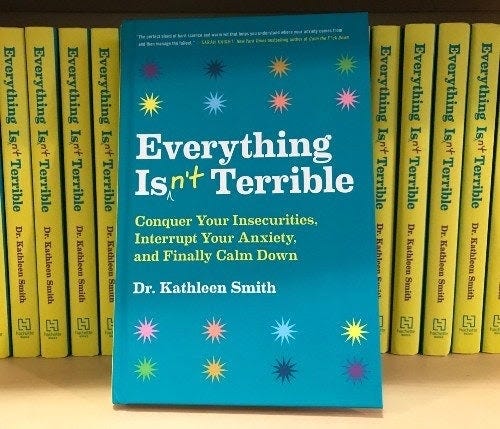Romance, Responsibility, and Anglerfish Mating Rituals
Here's the best gift to give someone you love.
Can’t wait to get a copy of my next book, True to You? My publisher is giving away fifty copies on Goodreads this month, and you can enter here. Also, if you want to receive weekly emails from me, consider upgrading your subscription. More downloadable worksheets are coming down the pike.
It’s almost Valentine’s Day, so let’s talk about the bizarre mating rituals of anglerfish.
The male will bite into the female, latching onto her body. Their skin and blood vessels fuse, so the male gets all the nutrients he needs from the female. Then most of the male’s body parts, now unnecessary, begin to wither away as they become one creature. (You can see their little blobs attached to the female in the picture above.)
It is a useful, horrific, and hilarious metaphor for marriage, no? We all gain something from our relationships, but we also tend to lose some of our functioning. There are things we forget how to do, or things we never learn to do, because someone is there to do them. This is true for any significant relationship—not just romantic ones.
How do you hold onto yourself, while being connected to someone else? It’s the central question that guides my work. Because unlike anglerfish, we can retain our individuality in key relationships.
If you’re still searching for a Valentine’s Day gift, let me make a weird suggestion. Sometimes the best gift you can give someone you love is to take responsibility for your own functioning.
This could look like:
Learning to do a task they always have to do for you.
Getting a little more competent with a piece of technology.
Making plans if you’re usually not the one to make them.
Trying to troubleshoot on your own first before asking for help.
Prioritizing your health without needing them to convince you to do so.
Working on yourself in other relationships.
Not needing someone to always be in a good mood.
Not needing them as a buffer when you visit family.
Evaluating yourself before asking, “How do you think it went?” or “How do I look?”
This isn’t about becoming so independent that you don’t need someone. It’s about adding flexibility to the relationship.* Then when people do help, it’s because they want to—not because they feel pressure to do so. And not because it’s the fastest way to calm things down.
The less pressure there is to calm each other down, the more freedom there is to genuinely enjoy each other. To be curious about each other’s challenges without feeling like you have to fix them.
Your exercise: Think about an important relationship. It could be with your partner, a parent, an adult child, a sibling, a colleague, or a close friend. Where have you let your own functioning wither away, because they were willing to do these things? Maybe your mother always handled your taxes, or your son told you what vitamins to take. Maybe you’ve never had a conversation with your child’s teacher, or driven on a road trip, or taken notes in a meeting, or looked in the mirror and said, “I look great.”
Your assignment: Now think and write about how you want to build up some of your own capabilities. Where do you want to fill in the gaps in your own maturity? Make a plan.
*Just one disclaimer—sometimes when we become more capable, it can temporarily increase the anxiety in a relationship. Your partner, or your mother, might cry, “You don’t need me anymore!” But over time, if they can see that you’re not going anywhere, they might find that they appreciate the flexibility.
News from Kathleen
Want a signed, personalized copy of my next book, TRUE TO YOU? You can preorder it from my neighborhood bookstore, East City Bookshop. I’ve also created a digital bonus workbook for newsletter subscribers who preorder. More on that soon!
Want to read more of my writing? Get my book, Everything Isn't Terrible, from Amazon, Barnes and Noble, or your local bookstore (best option).
Want a free anxiety journal with the book? Calming Down & Growing Up: A 30 Day Anxiety Journal includes thirty daily prompts to help you reflect on and respond to your anxious behaviors. To receive a copy, just email me your receipt of Everything Isn’t Terrible.
Email me if you’re interested in Bowen theory coaching or want me to speak to your group or workplace. Follow me on Linkedin, Facebook, or Instagram.
Want to learn more about Bowen theory? Visit the Bowen Center’s website to learn more about their conferences and training programs.







❤️